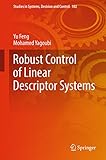Robust Control of Linear Descriptor Systems [electronic resource] / by Yu Feng, Mohamed Yagoubi.
By: Feng, Yu [author.] .
.
Contributor(s): Yagoubi, Mohamed [author.] | SpringerLink (Online service)
| SpringerLink (Online service) .
.
Material type:  BookSeries: Studies in Systems, Decision and Control: 102Publisher: Singapore : Springer Nature Singapore : Imprint: Springer, 2017Edition: 1st ed. 2017.Description: XI, 142 p. 17 illus., 9 illus. in color. online resource.Content type: text Media type: computer Carrier type: online resourceISBN: 9789811036774.Subject(s): Control engineering
BookSeries: Studies in Systems, Decision and Control: 102Publisher: Singapore : Springer Nature Singapore : Imprint: Springer, 2017Edition: 1st ed. 2017.Description: XI, 142 p. 17 illus., 9 illus. in color. online resource.Content type: text Media type: computer Carrier type: online resourceISBN: 9789811036774.Subject(s): Control engineeringIntroduction -- Linear Time-Variant Descriptor Systems -- Dilated Linear Matrix Inequality -- Dissipative Control under Output Regulation -- Admissibility with Unstable and Nonproper Weights -- Performance with Unstable and Nonproper Weights -- Parametric Sensitivity Constrained Linear Quadratic Conrtrol -- Concluding Remarks.
This book develops original results regarding singular dynamic systems following two different paths. The first consists of generalizing results from classical state-space cases to linear descriptor systems, such as dilated linear matrix inequality (LMI) characterizations for descriptor systems and performance control under regulation constraints. The second is a new path, which considers descriptor systems as a powerful tool for conceiving new control laws, understanding and deciphering some controller’s architecture and even homogenizing different—existing—ways of obtaining some new and/or known results for state-space systems. The book also highlights the comprehensive control problem for descriptor systems as an example of using the descriptor framework in order to transform a non-standard control problem into a classic stabilization control problem. In another section, an accurate solution is derived for the sensitivity constrained linear optimal control also using the descriptor framework. The book is intended for graduate and postgraduate students, as well as researchers in the field of systems and control theory. .


There are no comments for this item.